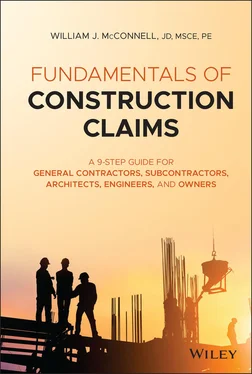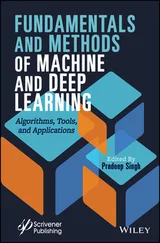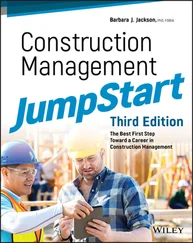1 ...6 7 8 10 11 12 ...15 Added Scope: When one party relies upon the design provided by the other party and the design later expands and the expanded design impacts the costs and/or schedule of the party that relied upon the original design.
Changed Scope: When one party relies upon the design provided by the other party and the design later changes and the changed design impacts the costs and/or schedule of the party that relied upon the original design.
Design Errors: When one party relies upon the design provided by the other party and the party that relies upon the design identifies flaws in the design that will cause cost and/or time impacts to its work.
Design Omissions: When one party relies upon the design provided by the other party and the party that relies upon the design identifies omissions in the design that will cause cost and/or time impacts to its work.
Late Design Issuance: When one party relies upon the design provided by the other party and the party that is responsible for the design is late in issuing its complete design and this causes cost and/or time impacts to the other party's work.
Excessive Changes: When one party relies upon the design provided by the other party and the party that relies upon the design is faced with numerous design changes during construction of the project, which causes a cumulative impact to its work.
Cardinal Changes: When one party relies upon the design provided by the party and the party that is responsible for the design fundamentally alters the scope of the other party's work via a change or changes in the design, which frustrates or makes impossible the purpose of the agreement by significantly increasing the volume of the work, by drastically modifying the type of work, and/or by greatly increasing the original contract costs.
Standard contract forms define the administrative duties required by each party to the agreement. For instance, on a design-bid-build stipulated sum agreement between a contractor and an owner, each party relies upon the other party to timely and properly administer payment applications, submittals, requests for information (RFIs), inspections, and other administrative duties. When one of the parties fails to administer the contract as required, and this detrimentally impacts the other party's cost and/or time on a project, the impacted party can assert a maladministration claim against the other party. Such claims are often difficult to quantify contemporaneously—as the claimant often has to establish a pattern of maladministration—so impacts are frequently determined retrospectively, after much or all of claimant's work is complete. Typical maladministration claims include:
Payment Administration Issues: When one party maladministers the payment process and this impacts the other party's costs and/or time on the project.
Proof of Funding Issues: When the paying party is required to show the performing party proof of adequate and its failure or delay in doing so impacts the performing party's costs and/or time on the project.
RFI Administration Issues: When one party maladministers the RFI process and this impacts the other party's costs and/or time on the project.
Submittal Administration Issues: When one party maladministers the submittal process and this impacts the other party's costs and/or time on the project.
Change Order Administration Issues: When one party maladministers the change order process and this impacts the other party's costs and/or time on the project.
Inspection Issues: When one party maladministers the inspection process and this impacts the other party's costs and/or time on the project.
Subcontractor Issues: When one party maladministers the process of submitting or approving subcontractors and this impacts the other party's costs and/or time on the project.
Project Management Team Issues: When one party maladministers the process of submitting or approving project management team members and this impacts the other party's costs and/or time on the project.
QA/QC Issues: When one party maladministers the quality assurance/quality control process and this impacts the other party's costs and/or time on the project.
Safety Administration Issues: When one party maladministers the safety process and this impacts the other party's costs and/or time on the project.
Certain maladministration claims are easy to pinpoint, such as delinquent payments or lack of proof of funding. For these issues, contracts typically allow the claimant to halt work if respondent payments or proof of funding are not completed within a certain number of days after the claimant's notice to respondent. For other maladministration issues, it can be challenging to point to a single event as resultant impacts are often cumulative in nature. Cumulative impacts are analogous to death by a thousand cuts. Cumulative impacts might involve the excessive turnaround time of requests for information (RFIs), submittals, or change orders. Another example of a cumulative impact claim would be inspection delays or over-inspection issues.
Performance issues involve claims made by one party to the contract that assert that the performance of the other party (or third parties that the other party is responsible for, such as subcontractors and vendors) is noncompliant with the contract requirements. However, there are instances when the paying party to a contract takes on performance obligations, such as furnishing materials to the performing party or completing work that is a predecessor to the performing party's work. When a party fails to perform its physical work in accordance with the contract terms, and this failure affects the other party's cost and/or time on a project, the affected party can assert an affirmative claim to seek recovery per the contract terms. Typical performance issues involve:
Quality Issues: When the physical work of one party is noncompliant with the contract requirements and it impacts the other party's costs and/or time on the project.
Schedule Issues: When the work of one party is not performed per the contract schedule and this impacts the other party's costs and/or time on the project.
Separate Contractor Issues: When the physical work of one of the party's subcontractors, vendors, or separate contractors is noncompliant with the contract requirements and the contract makes this party responsible for its entities, and one of these entities impacts the other party's costs and/or time on the project.
Third-party issues typically fall into one of two groups. First, when a party to an agreement, such as a subcontractor in a contractor–subcontractor agreement, is impacted by an owner–designer issue, most contracts allow the subcontractor to submit a claim to the contractor and then the contractor is obligated to pass the claim through to the owner for attempted recovery. Standard contract agreements have strict procedural requirements for this type of claim. Second, when one or both parties to an agreement are impacted for reasons that are out of the control of both parties to the contract, such as a hurricane, certain contract forms allow additional time as the exclusive remedy for the claimant, while others keep the door open for the recovery of both cost and time impacts related to the impact. For this second group of impacts, standard contract forms also have strict procedural requirements such as the source for weather data, etc. Examples of third-party issues include:
Pass Through Issues: When the agreement between two parties contemplates pass through claims and when the performing party that is able to submit a pass through claim has cost and/or time impacts due to a pass through issue, such as a design error.
Читать дальше












